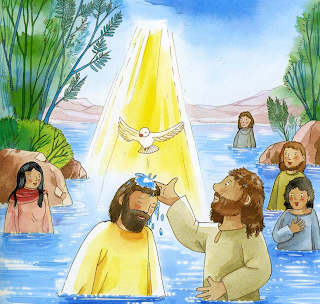 |
| Image: Pixabay.com |
TO CHEW ON: "You have turned for me my mourning into dancing;
You have put off my sackcloth and clothed me with gladness." Psalm 30:11
What are you wearing right now? Chances are it's something comfortable, suitable to the temperature in the room, car, outdoors or wherever you are, and was chosen with various things in mind.
Clothing does so much. It protects and warms us (or is scant enough that we don't get too warm). It preserves our modesty and may hide what we consider physical flaws and shortcomings. We choose our clothes with many things in mind—comfort, style, the activities we're planning to do wearing them, season of the year, color. They give subtle messages about our status and wealth, whether we're neat or sloppy, how we feel about the occasion and the company we're in.
We find many references to clothes in the Bible, both literal and symbolic.
Immediately after Adam and Eve sinned, they felt the need for physical clothes. The patriarchs tore their clothes to demonstrate grief. The clothes of the priests were rich with meaning and symbolism.
The many things that clothes do for and say about us give the clothing metaphors and symbols that run through the Bible added significance.
- God dresses like a warrior - Isaiah 59:17.
- His provision in the Old Testament is symbolized by the priests who were "clothed in salvation" - 2 Chronicles 6:41. (As we read today in Leviticus 1-4 about about the offerings the priests had to make so that sinful people could approach a holy God, we can only imagine how bloody and soiled their priestly clothes must have become--a reminder that salvation is costly.)
- God exchanges our filthy spiritual clothes for clean ones - Zechariah 3:4.
- He cleans up prostitute Israel and dresses her in embroidered cloth, sandals of badger skin, fine linen and silk - Ezekiel 16:10.
- He takes off the pigsty rags of the prodigal and puts on the best robes, rings and sandals of a son - Luke 15:22.
- He gives those who trust in Him clothes of praise, salvation, righteousness (Isaiah 61:3,10) and in our focus verse, "gladness" - Psalm 30:11.
- His children are dressed like king's kids.
- The royal daughter wears clothing "woven with gold" - Psalm 45:13.
- The training of our parents is jewelry—"a graceful ornament on your head, and chains about your neck" - Proverbs 1:9.
- Wisdom is our head-ornament and crown - Proverbs 4:9.
- God gives us a whole wardrobe for life on His side.
- There is armor for fighting - Ephesians 6:13-17.
- There is the unencumbered spandex of the Christian race - Hebrews 12:1.
- And especially for women, there are the clothes of good works, godliness (1 Timothy 2:10), and a quiet and gentle spirit (1 Peter 3:4).
- To meet Him someday, he provides a wedding garment (Matthew 22:11) of "fine linen, clean and bright" (Revelation 19:8).
I ask myself, and you, what spiritual clothes are we wearing? Have we chosen to claim all God's promises and let Him take off our sackcloth of worry, fear, care, and life-distraction? Have we browsed through His rich clothes closet for all that's available to us?
PRAYER: Dear Father, thank You for all that these spiritual clothes signify of salvation, protection, purity, plenty, preparedness, identity as Your children, and more. Help me, by faith, to put on clothes from Your closet today. Amen.
PSALM TO PRAY: Psalm 30
The Bible Project VIDEO: Leviticus (Read Scripture Series)
*********
Unless otherwise noted all Scripture quotations are taken from the New King James Version®. Copyright © 1982 by Thomas Nelson, Inc. Used by permission. All rights reserved.





